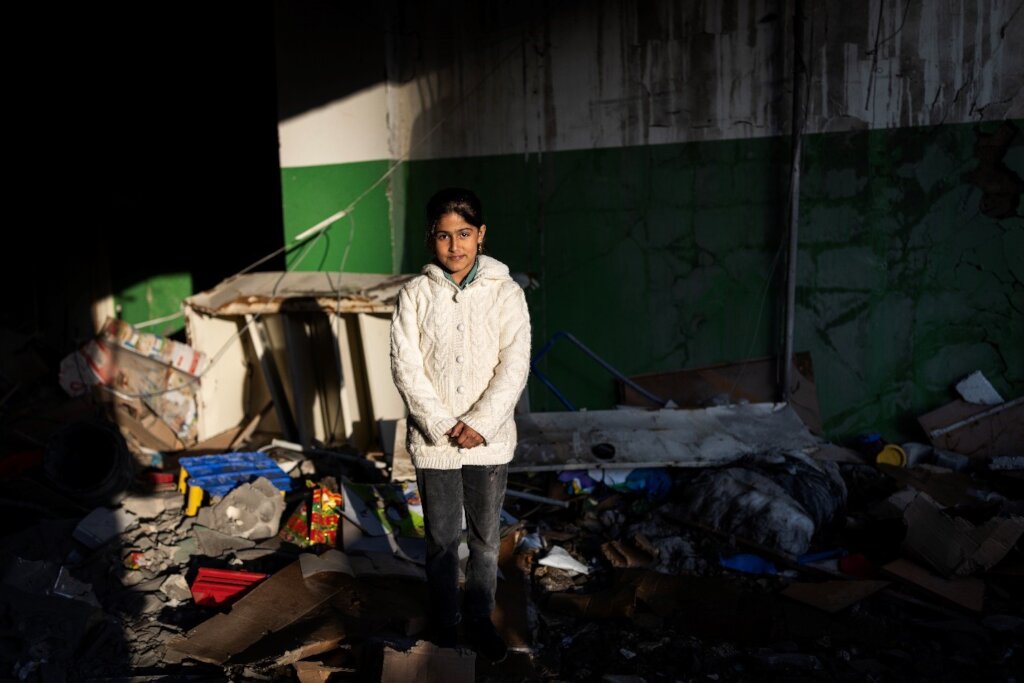By Arantxa Moreno | Manager
Khiam, Lebanon – February 13, 2025: Ahlam, 9, a girl, poses for a portrait inside her destroyed school. Displaced by the war, she was forced to leave her home in Khiam and move to Bekaa. “There was nothing to do there. I used to play with a little girl. I had my notebooks and pencils, and I would write, but I wasn’t really studying. I thought the school would be just a bit damaged, but now I see it’s completely destroyed—just like everything around it. And some people are still missing. I missed my school a lot, studying here. They told me that Zahraa was killed, but I didn’t believe it. When I came back and heard it from everyone, that’s when I knew for sure. I used to be scared that missiles would hit us. And I was always worried the war would start all over again.”
Dear friends,
Children in Lebanon are struggling to recover from a devastating war. In the aftermath of months of bombardments, they are facing prolonged and intensified vulnerability due to physical injuries, emotional shocks, loss of learning and inadequate nutrition, which are all threatening their health and development. Wave after wave of deadly air strikes upended children’s lives, forced families to flee their homes, and destroyed infrastructure and services that children depend on.
Just about every child in Lebanon has been affected in some way. Hostilities between Israel and Lebanon escalated sharply in September 2024 after 11 months of cross-border strikes. The war officially ended two months later, with more than 310 children killed and over 1,500 wounded. Many children suffered traumatic brain injuries and shrapnel wounds, while some lost limbs. An estimated 400,000 children were forced to flee their communities. Humanitarian needs remain staggering.
With your generous support, UNICEF provided critical services to over 557,000 people throughout the conflict and delivered emergency aid to 695 shelters. Since the November 27, 2024 ceasefire, UNICEF has been assisting displaced families as they return to their homes while continuing to support those who are still in shelters. This includes protecting children and helping them heal from the traumatic conflict, facilitating access to mental health and psychosocial support and other specialized services. UNICEF is working to pave the way for national recovery, helping ensure that:
If you would like to continue to support children across the globe, please consider contributing to UNICEF’s overall humanitarian response, which allows UNICEF to deliver the most impactful results for children in emergencies.
When the needs of children are constantly evolving, the flexibility to use these funds in the most agile way possible is critical. When time is of the essence, Country Offices can receive funding within 24 hours. This funding is UNICEF’s critical “first responder,” allowing UNICEF to reach and help children in the first few days of any emergency. UNICEF’s rapid transfer mechanism saves lives across the globe. It also saves costs. UNICEF can be agile across ~300 emergencies each year, adjusting and course correcting to best meet the needs of children at every juncture.
With your generous support of even $1 invested in high-risk humanitarian contexts, UNICEF can save an average of over $4 on the next emergency and speed up operations by more than 12 days.
In Partnership,
Arantxa Moreno
Project reports on GlobalGiving are posted directly to globalgiving.org by Project Leaders as they are completed, generally every 3-4 months. To protect the integrity of these documents, GlobalGiving does not alter them; therefore you may find some language or formatting issues.
If you donate to this project or have donated to this project, you can receive an email when this project posts a report. You can also subscribe for reports without donating.
